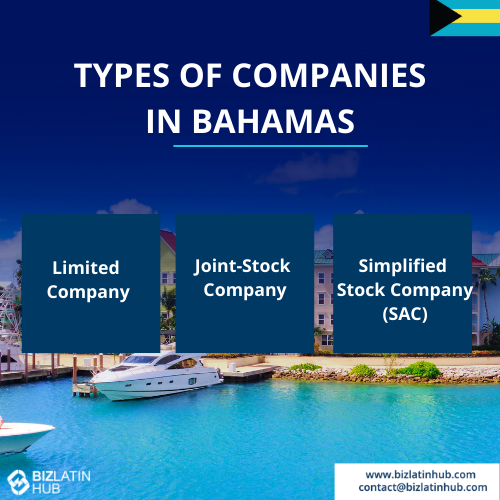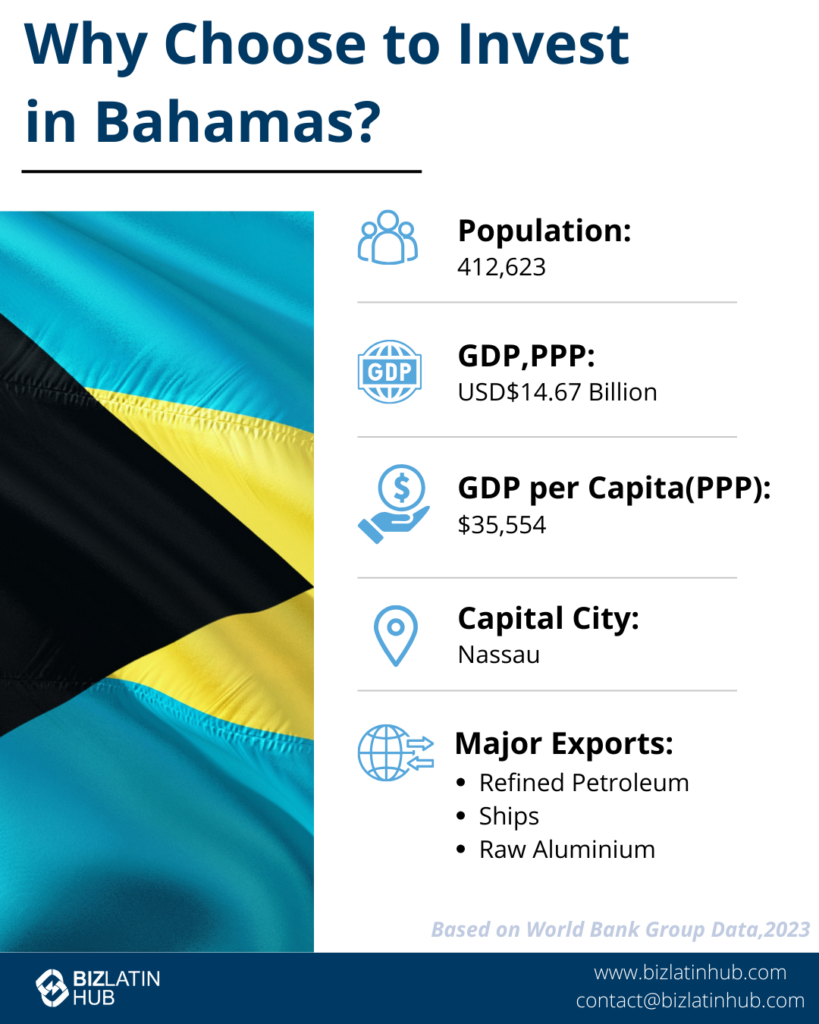The Bahamas is a well-known offshore financial center offering a favorable tax regime and investor-friendly environment. Foreign investors can choose between International Business Companies (IBCs), Limited Liability Companies (LLCs), and foreign branches. This guide outlines the main legal entity types and how to incorporate your business in The Bahamas.
Key Takeaways
| What are the common legal entity types in the Bahamas? | International Business Companies (IBCs), Limited Liability Companies (LLCs), and Exempted Limited Partnerships (ELPs) |
| What company type offers offshoring? | The IBC is the world-renowned vehicle for offshore business. |
| What is the most common Bahamanian business entity? | The most frequently incorporated legal entity in the Bahamas is the IBC. |
| What are the primary considerations when choosing a business entity in the Bahamas? | Ownership Structure. Tax Efficiency. Profit distribution. Transfer Pricing. Compliance. Flexibility. |
Main Legal Entity Types in The Bahamas
The Bahamas offers several types of business entities. Each type caters to different business needs and preferences. These include International Business Companies (IBCs), Limited Liability Companies (LLCs), and Exempted Limited Partnerships (ELPs).
Comparison Table: Key Legal Entity Types in The Bahamas
| Entity Type | Best For | Members/Shareholders | Liability | Legal Personality | Tax Status |
|---|---|---|---|---|---|
| IBC | Offshore activities, asset holding | 1+ | Limited to capital | Yes | Tax-neutral (offshore) |
| LLC | Professional services, asset protection | 1+ | Limited to capital | Yes | Tax-neutral (offshore) |
| Branch | Multinational operations | 1 (foreign HQ) | Parent company liable | Yes | Taxable on local income |
International Business Company (IBC)
International Business Companies (IBCs) are a preferred choice in the Bahamas. They offer notable tax advantages. IBCs are exempt from corporate income tax, capital gains tax, and inheritance tax. This makes them appealing to international investors. Another benefit is privacy. Directors and shareholders of IBCs do not have their identities publicly disclosed. IBCs require a minimum authorized share capital of just USD 1. No minimum paid-up capital or annual return filings are needed. The tax exemption lasts for 20 years after incorporation. IBCs require a completed application, identification documents, and proof of address to form.
Expert Tip: Foundations for Estate Planning
From our experience, while the IBC is great for business, the Bahamian Foundation is superior for wealth preservation. Unlike a Trust (which is a legal relationship), a Foundation is a legal entity that can hold assets in its own name. It provides a robust shield against creditors and forced heirship rules. We often advise clients to use a Foundation to hold the shares of their IBC for a complete asset protection structure.
Limited Liability Company (LLC)
Limited Liability Companies (LLCs) in the Bahamas offer flexibility and protection. There is no need for a minimum share capital. LLCs benefit from no corporate tax, which attracts entrepreneurs. The structure separates personal assets from business liabilities, protecting personal wealth. Unlike other corporations, LLCs do not need a board of directors or formal meetings. This simplifies governance. The Bahamas’ regulatory environment supports straightforward shareholder requirements. The rules allow flexible director appointments. LLCs can operate locally or internationally.
Exempted Limited Partnerships (ELPs)
Exempted Limited Partnerships (ELPs) suit those who prefer a blend of partnership and corporate elements. ELPs need one general partner and one limited partner. Limited partners enjoy limited liability, protecting personal assets. General partners have unlimited liability and manage the partnership. ELPs have no minimum share capital and are exempt from corporate tax. Like IBCs, ELPs focus on offshore activities, which attracts international investments.
Branch of a Foreign Company
Installing a branch in the Bahamas is an attractive alternative option for companies who have headquarters in a foreign country. In order to install the branch, proof of the existence of the office overseas must be provided to local authorities. It suits already well-established companies looking to build on existing brand awareness.
The branch will have to prove the following conditions:
- A representative in the country where the company is being established.
- Carry out business in line with partnership purposes.
- Have own accounting and submit annually its balance sheet to the controlling authority.
Who Should Choose Which Legal Entity in the Bahamas?

IBC – International Business Company
Who should choose this: Ideal for international trading, investment holding, or asset protection. Offers anonymity, flexibility, and no local tax on offshore income.
LLC – Limited Liability Company
Who should choose this: Useful for small firms, professional services, or asset protection. Combines partnership-style flexibility with corporate liability protection.
Branch
Who should choose this: Foreign companies wanting a physical presence in The Bahamas. Suitable when keeping corporate control centralized but carries full parent liability.
How to Choose the Right Legal Structure in The Bahamas
The Bahamas offers several business entity types. You can choose from International Business Companies (IBCs), Sole Proprietorships, Partnerships, Joint Ventures, and Foundations. Each option has its own set of benefits and requirements. Many entrepreneurs prefer IBCs. This is due to their flexibility and tax exemptions on corporate taxes for the first 20 years.
They are also exempt from stamp and estate duties. Registering a business in the Bahamas is quick. Typically, it takes about one week after submitting the necessary forms and documents. For foreign investors, Simplified Stock Companies (SACs) are appealing. They offer simplicity and fewer formalities compared to other corporate structures.
Assessing Business Needs
Understanding financial structures and banking arrangements is crucial in the Bahamas. You will need a corporate bank account suited to your business. Opening one involves choosing the right bank and submitting documents, such as identity and company registration papers.
While there is no income tax, be aware of other taxes. These include value-added tax (VAT), stamp tax, real property tax, and import duties. Operating costs can be high. Budget for office space, utilities, and labor. Also, if hiring foreign employees, plan for the process of obtaining work permits.
Evaluating Operational Goals
The Bahamas provides a tax-neutral environment. This means no corporate income, capital gains, or inheritance tax, maximizing your retained earnings. A business license is required. Fees are based on gross turnover. For small businesses with turnover below BSD50,000, the annual fee is BSD100. You must submit a detailed Project Proposal to the Bahamas Investment Authority. This ensures your business aligns with national economic interests. If your IBC carries on active business, you need a license and must pay an annual business license tax.
Considering Compliance and Regulatory Factors
Businesses must promptly report major changes. This includes changes in address, company name, share structures, or membership. Compliance with local regulations and industry guidelines is mandatory. This affects operations, marketing, and sales. Register with the National Insurance Board to cover employees, as required by law. A Business License is necessary, though some activities may be exempted. Annually, businesses must file an Annual Return to the Registrar. This document details directors, shareholders, and financial health.
The IBC Modernization
The Bahamian IBC has evolved. It is no longer just a “shell.” Under recent legislation, IBCs can now hold assets in the Bahamas and trade locally (subject to exchange controls and taxes). This removal of the “ring-fence” was done to comply with global tax standards, making the IBC a more versatile, substantial entity type.
Steps to Incorporate a Company in The Bahamas
Now you know the enticing prospects of doing business in The Bahamas, here are the 5 steps to incorporating a company in the Bahamas:
- Step 1: Preliminary Foundations.
- Step 2: Company Legal Structure.
- Step 3: Registration with Key Institutions
- Step 4: Incorporation Document.
- Step 5: Legal Representation.
Compliance Tip:
Even tax-exempt IBCs and LLCs must maintain proper accounting records and meet economic substance rules if carrying on relevant activities. Annual renewal and a registered agent are also required.
Common Pitfalls When Choosing a Legal Entity in The Bahamas
- Assuming IBCs are entirely exempt from compliance — they must meet substance or reporting standards
- Choosing LLC when a simpler IBC structure would suffice
- Not appointing a licensed registered agent
- Ignoring CRS/FATCA obligations if holding financial assets
- Using a branch without understanding full liability exposure
Partnering with Biz Latin Hub for Company Formation in The Bahamas
Looking to establish your business in the Bahamas? Biz Latin Hub provides comprehensive support for company formation, regulatory compliance, and tax advisory services. Their experienced team helps entrepreneurs navigate the incorporation process, maintain compliance, and optimize their business structure.
For expert assistance with your Bahamas business venture, contact us here.
FAQs: Legal Entities in The Bahamas
The International Business Company (IBC) is the most widely used structure due to its simplicity, confidentiality, and tax neutrality for offshore income.
Yes. There are no restrictions on foreign ownership for IBCs, LLCs, or branches, although a licensed local registered agent is required. Certain sectors (retail, construction, fishing) are reserved for Bahamians. Foreigners entering open sectors usually require approval from the National Economic Council.
No. IBCs are exempt from local income taxes as long as they do not generate revenue in The Bahamas. However, substance requirements apply to some activities.
Incorporation is fast — often 1–3 business days if all documents are in order.
Yes. While not always submitted to authorities, IBCs and LLCs must maintain financial records that can be inspected if required.
An IBC is a traditional offshore company with corporate structure. An LLC blends corporate and partnership elements, useful for flexible profit distribution.
Yes. Branches of foreign companies are taxable on local-source income and must comply with reporting and licensing requirements.
An Exempted Limited Partnership is used primarily for investment funds. It has a General Partner (liable) and Limited Partners (investors).
What are the Advantages of Establishing a Business in the Bahamas?
The Bahamas offers several compelling advantages for businesses looking to establish operations in a tax-neutral and investor-friendly environment. The country provides numerous benefits that enhance its appeal to international and foreign investors.

Tax neutrality benefits
The Bahamas stands out for its tax-neutral environment. There is no corporate income tax, capital gains tax, or income tax. Businesses are free from sales tax and inheritance tax. The absence of these taxes allows companies to reinvest and grow without significant tax burdens. Businesses only pay licensing fees, property taxes, stamp taxes, and import tariffs. This limited tax liability can lead to substantial savings. Moreover, Bahamian International Business Companies (IBCs) enjoy 20 years of tax and exchange control exemptions.
Flexible corporate structures
The Bahamas offers a variety of corporate structures. Businesses can choose from International Business Companies (IBCs), limited liability companies (LLCs), and partnerships. These structures provide flexibility to meet different business needs. An IBC requires only one shareholder and one director, with no nationality requirements. There is no minimum capital requirement for IBCs, which gives investors the flexibility to decide the investment scale. Also, there are no annual return or audited account obligations for IBCs, easing reporting duties.
Significant privacy protections
Privacy is a key benefit of Bahamian business operations. The country does not have a public registry for offshore companies. This means information about beneficial owners stays confidential. The Bahamas has strict confidentiality laws, ensuring only a company’s registration number, name, and registered office are public. Trusts in the Bahamas also have strong privacy protections for settlors and beneficiaries. Companies can use nominee directors and officers for added privacy. Finally, offshore entities have no personal or corporate tax reporting needs, further protecting financial confidentiality.
Simple incorporation processes
Incorporating a business in the Bahamas is straightforward. The process suits both local and international businesses. Setting up a company here can take just a week. This speed is appealing to entrepreneurs. A local address is required for registration. The process involves choosing a company name and deciding on the structure. Then, you register with the Registrar General’s Department. Total registration costs are around $1,455. This fee covers legal documents, registration, and an official address for one year.
Compliance with international standards
Companies in the Bahamas must follow anti-money laundering (AML) laws. Both local and international businesses need thorough checks and reporting. Know Your Customer (KYC) verification is vital. It confirms the identity of stakeholders. The International Business Act 2000 and 2010 governs company operations. Businesses must also get a license to work in the Bahamas. Economic Substance compliance requires some activities to be directed from within the country. This aligns with global regulations.
Economic substance requirements
Certain sectors in the Bahamas must meet economic substance rules. These sectors include banking, insurance, and fund management. Companies in these areas need a physical presence in the Bahamas. Those outside these activities do not need physical facilities. Businesses must report their economic presence regularly. Non-compliance can lead to audits or large fines. Companies have 28 days to meet these requirements.






